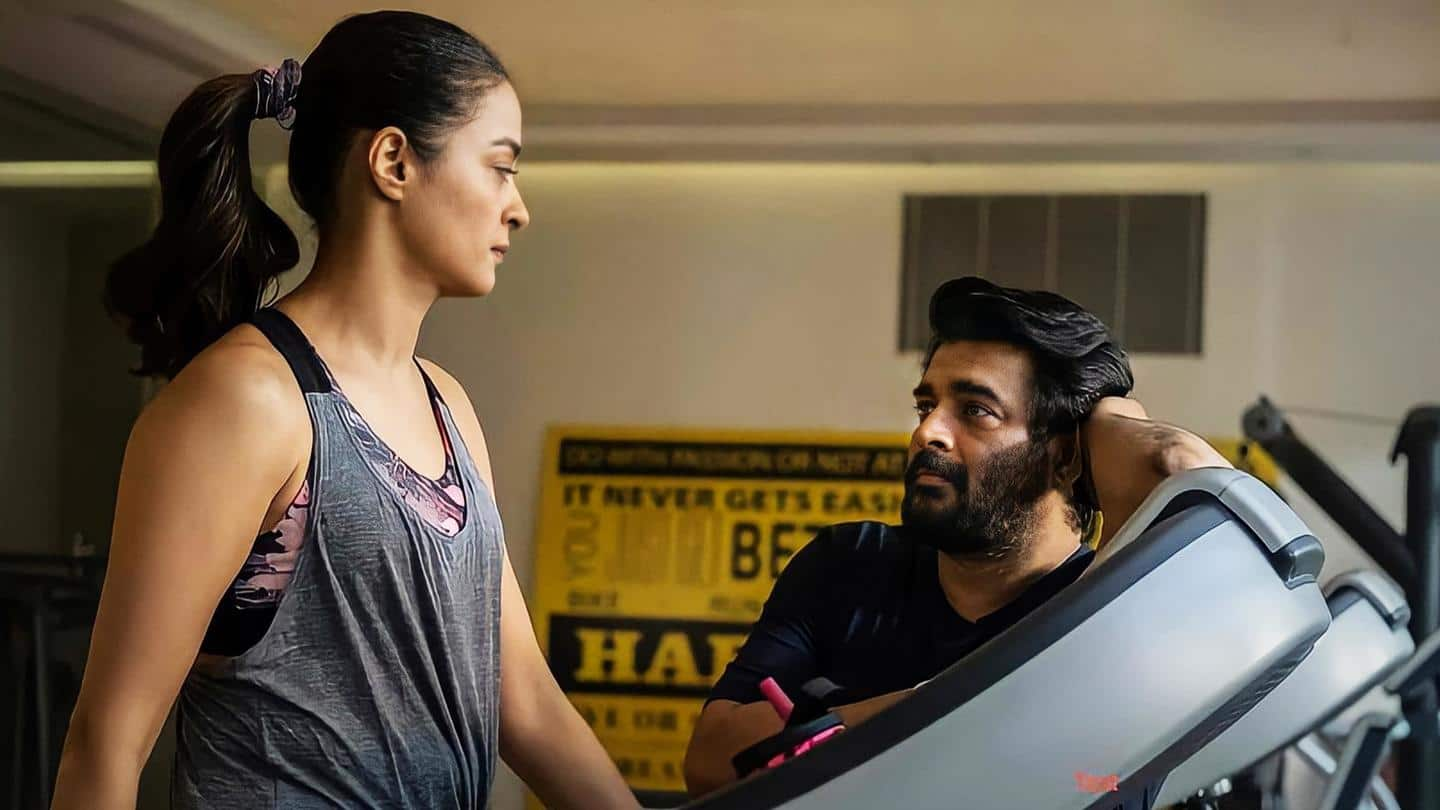It would be insightful to hear a psychologist’s take on Arya Iyer, the dominant caste cis-het male protagonist of the Netflix show Decoupled. Created and written by author and columnist Manu Joseph, and directed by Hardik Mehta, Arya Iyer (R. Madhavan) seemingly falls within the spectrum of Narcissistic Personality Disorder (NPD).
Arya embodies the classic traits of one with NPD such as a grandiose sense of self importance, a desperate yearning for consistent admiration, inability to empathise, entitlement, conversation hogging, having buddies to trash-talk with but no genuine friends, negging to bait people with insults, constantly gaslighting the partner, inability to self-reflect and the endless manifestations of classist and casteist abuse of waiters, waitresses, drivers, bartenders and domestic workers.
Comprising of eight episodes, Decoupled tells the story of Arya Iyer and Shruti Sharma (Surveen Chawla), who have been navigating a dead marriage for the sake of their daughter. Arya is an author of mainstream pulp fiction and Shruti is a successful venture capitalist. The couple live with their daughter in an elite Delhi residential space, and the series chronicles their attempts to keep their marriage functional so as to protect their daughter from the possible trauma of witnessing a separation.
The show tries to present a satirical commentary on modern, urban marriages through circumstantial anecdotes on how marriage in itself is a structure that sets individuals up for failure. While this is possibly true, Decoupled suffers from a fundamental problem that makes it a triggering, problematic take on relationships and the society – the use of satire less as a tool for socio-political critique and more as a means of validating male entitlement.
#MeToo jokes, vaginas, fake orgasms: Mansplaining male entitlement on the pretext of humour
In a particular scene in Decoupled when Prof Basu, Arya and Sruthi’s neighbour says, “Sorry, actually I’m too afraid of being Me-Too-d” everyone laughs and Arya adds, “Have you noticed how men have started using #MeToo as an excuse to talk to women about sex? It has almost become a kink.”
Centering men’s victimhood and their fear of being wrongly accused of sexually assaulting women as a bigger problem than sexual assault itself is the essence of the ‘Him Too‘ movement. #HimToo is a misogynistic trope popularised after Brett Kavanaugh to undermine the integrity of survivors’ experiences to gaslight them and discourage them from coming forward. Trivialising the #MeToo movement enables rape culture and dismisses women’s lived experiences. Jokes made by men about a movement against sexual assault, sexual harassment and the questioning of the abuse of gendered institutional power are nothing but rape jokes.
Equating conversations about #MeToo to sex is equating sexual assaults and rape to sex. Minimising the importance of women’s consent is malignant and tasteless. #MeToo analogies made by men are rape analogies. There is no humor or entertainment in the normalisation of sexual violence against women.
In a scene at a restaurant, Arya asks Shruti if she knows why women like flowers and tells her that it is because ‘flowers are like vaginas’. The vagina cannot talk for itself, not because the vagina has no voice but because just like all people with vaginas, the vagina has to listen to a cis-man equate flowers with vaginas and mansplain to a woman why that is so. In case you wondered where the chauvinistic concept of ‘deflowering’ came from, look no further. Essentialising womanhood to ‘vagina’ is transphobic. It’s not just women who have vaginas. Not all women have vaginas, and not all women like flowers because they are representative of vaginas in the male conscience

When Prof. Basu asks, “Why can’t you shake the hand of a boy?“, Arya responds, “At this stage in their lives, their hands are busy doing stuff, you know? Which I don’t have a problem with..that’s fine..but they don’t wash after.” When Prof. Basu clarifies that he’s just fourteen, the camera pans to the boy with the sort of background music that suggests something about the boy.
Masculinising teenage masturbation attributes to the double standards and stigmatisation of masturbation for girls that develop into masturbation shame and guilt amongst women. Girls and other young people masturbate too. By singling out the masturbating boy, Decoupled produces the image of a young man with an uncontrollable sexual desire, a ’tiny monster’ who will grow up to become an untamable man who cannot control his sexual urges, as opposed to a woman who is a passive object that exists in his gaze, to please him- contributing to gendered power relations and toxic masculinity that cannot handle rejection and submissive femininity that struggle to say ‘no‘, scaffolding rape culture.
In a scene at a restaurant, Arya asks Shruti if she knows why women like flowers and tells her that it is because ‘flowers are like vaginas‘. The vagina cannot talk for itself, not because the vagina has no voice but because just like all people with vaginas, the vagina has to listen to a cis-man equate flowers with vaginas and mansplain to a woman why that is so. In case you wondered where the chauvinistic concept of ‘deflowering‘ came from, look no further.
Essentialising womanhood to ‘vagina‘ is transphobic. It’s not just women who have vaginas. Not all women have vaginas, and not all women like flowers because they are representative of vaginas in the male conscience.
Also read: Female Gaze In Pop Culture: Changes In The Gender Lens When Women Tell Stories
![Download Decoupled - Netflix Original (2021) Season 1 Hindi Complete WEB Series 480p [700MB] | 720p [1.4GB] WEB-DL - Vegamovies.NL](https://i.imgur.com/pd2tbCF.png)
In another scene in one of the early episodes of Decoupled, Arya spots Shruti in her track pants and makes a remark about her butt crack, and the presence of a stitch around that area in most women’s active wear attires, claiming that a woman’s clothing calls attention to her body. This implies that in the absence of any verbal communication from her, her clothing announces:
a. her willingness to serve the male gaze and
b. her sexual availability to men
Objectifying and dehumanising women by basing her primary value on her sexual appeal to men is the essence of victim-blaming.
Decoupled has a particularly problematic scene where there is mention of the female orgasm and jokes are made about how women fake them. The urge to control, demand and regulate women’s sexual expressions is misogynistic in a world that demonises women’s sexual desires whilst simultaneously portraying female fictional characters on the screen who serve the dominant male gaze and climax after a few seconds of penetrative sex, fueling heteronormative male fantasies.
Studies show that cis-het women fake orgasm to reinforce men’s sexual skills, validate his ‘hard work’ and end sexual intercourse because male fragility hinders women’s agency to freely communicate their sexual dissatisfaction especially due to the focus on men’s sexual pleasure. Women’s fake orgasm is an act of sexual agency and a result of the utter lack of alternative in a world where every 1 in 3 women has experienced sexual abuse.

In yet another scene in Decoupled, Arya and his friend meet with an editor from Netflix to discuss a pitch for a show involving Arya. In the course of the scene, the woman is told that she is not as attractive as her social media pictures seem to project. ’Negging’ is an emotional manipulation technique that became a wildly popular practice of toxic masculinity to make a first impression after Neil Strauss’s book, ‘The Game’.
The neg is a low-grade insult, disguised as a harmless joke, made by a man intending to momentarily lower a woman’s self-esteem to suggest his disinterest and undermine her self-confidence to make her vulnerable to his domination. The normalisation of negging in popular media is accompanied by the rise of incel culture and other anti-feminist movements that place women’s display of agency as provocation for violence, justifying ‘crimes of passion’ and other forms of violent behvaiour perpetrated by men against women.
One can go on and on in their analysis of the moments in Decoupled that are condescending and extremely offensive. In almost all scenes, Arya creates a ruckus in public gatherings, embarrassing his wife, by providing insights that seemingly call out the double standards of the elite society, while he himself is a character that seeks pleasure by replacing a rival author’s books to have his own in the Number 1 Best Seller racks of bookstores and making statements like “Memsahabs do not hire pretty looking maids….so here the maids only have inner beauty”
One scene mentions that some women deserve to be battered to have sense installed in them. This also attempts to pass off as humour, but lands flat and is extremely triggering. Jokes on battered women normalise abusive behaviors, perpetuate domestic violence, devalue the survivors, excuse male aggression and desensitise the society to violence against women. Sexist humour is disrespect in disguise that legitimises gender violence and leads to underreporting of domestic violence.

“Women don’t know that they have to be on top. It increases their chances of orgasm by 41%. When they are on top, they’re able to control the pressure. The key to orgasm is strong thigh muscles,” says one of Arya’s friends, while passing judgments on the women and the world sitting tight in the cocoon of their boy’s gang. This is classic ‘locker-room talk’ between men who ‘discovered‘ what women don’t know about themselves, about their own bodies nor about their own pleasure, because according to the ideals of toxic masculinity, women have no agency, no embodied knowledge, no sense of self. Male privilege entitles men with the spaces that enables them to engage in and be complicit with misogynistic banter with no accountability nor fear of consequences.
This portrayal of women as empty vessels in Decoupled isn’t harmless. Locker-room talk enables rape culture and Arya deals with his life’s problems through similar conversations with his boy gang. They also do not forget to make jokes about female ovulation and the menstrual cycle. It is a pervasive way of other-ing women as the lesser, irrational being, inferior to men and unworthy of respect. Scrutinising women’s bodies through the male gaze reduces women to an object for men’s sexual pleasure.
As this scene progresses, Arya’s friend who seems to know everything there is to know about women encourages him to download a period tracker app so that he can be aware of a potential fling’s ovulation day and proposition her for sexual intercourse on this “magical” day when nature spikes her sexual appetite to enable reproduction. Men decompartmentalising women’s ovaries is dehumanising and it legitimises the institutional regulation of women’s sexuality and patriarchy’s entitlement over women’s reproductive rights. Also, all people who menstruate are not cis-women.
Sarcasm, intelligent humour: The infantilisation of critical responses
One can go on and on in their analysis of the moments in Decoupled that are condescending and extremely offensive. In almost all scenes, Arya creates a ruckus in public gatherings, embarrassing his wife by providing unsolicited insights that seemingly call out the double standards of the elite society, while he himself is a character who seeks pleasure by replacing a rival author’s books to have his own in the Number 1 Best Seller racks of bookstores and making statements like “Memsahabs do not hire pretty looking maids….so here the maids only have inner beauty.”
There is a scene where Arya gets nauseous during a date on seeing that the woman has hair in her armpit, and another one where the posterior of an ex lover is used as a plot device to incite shame in him because he cannot flaunt her before his ‘perfectly desirable‘ wife to show off his skill to attract gorgeous women.
The series tries to pass off masculine self obsession and its projection of a stubborn, incorrigible, arrogant, ‘holier than thou‘ conscience as intelligent humour. The creator and writer of the show Manu Joseph refers to those who find Decoupled problematic as ‘simpletons‘.
Sarcasm is definitely a great narrative device that can effectively be used to critique social norms and offer subversive perspectives. But siding with a problematic protagonist, passing off his man-childish lack of accountability as subversion, building jokes on misogyny, rape humour, body shaming and gaslighting, as well as anchoring the victimhood of a privileged, cis-het, dominant caste, middle aged man on the constant outraging of women long abused and marginalised by male subordination is not effective sarcasm. Humour can be brutal, but not disrespectful, demeaning, sleazy or founded on the expense of a particular gender or social group. Dismissing women who call this out by branding them as lesser intellectuals who do not understand layered, sophisticated humour is worse, but sadly not surprising, coming from the universe of male fandom that pedestalises the lack of political accountalibilty and finds political correctness tiring
The same is the response by several anti-feminist, trigger happy men on social media towards women who find the show insufferable. When women call out sexist jokes and rape jokes, they are infantalised as touchy characters who lack a sense of humor. Demonising women as the problem-makers for pointing out misogyny and patronising them as ‘simpletons’ is not an original trope of male fragility as Manu Joseph’s inflated ego likes to tell himself.
Quite many fans of Decoupled also claim that this is how sarcasm works, that show is a critique of male entitlement itself. Eliciting a few laughs through seemingly self-depreciating humour, while maintaining the overall stance that the protagonist is just another vulnerable man stuck in a hypocritical world, is not well intentioned, or tastefully executed sarcasm. It is simply a validation of male mediocrity and toxicity.
The show does add a scene in the end where Arya defends Shruti to his daughter by saying that he is ‘difficult to stand by‘ and yet, she has done that for him. The question is – Does the viewer here feel that Arya is a man who deserves no more chances at the relationship, that he deserves to be walked out on and must not have the opportunity to continue thriving and being socially validated? No.
Adding a few intermittent lines that suggest confession of guilt by a problematic protagonist does not change the gender compass of a piece of art. At the end of it, if the protagonist still appears likeable and worthy of a Netflix show in the plot to further elaborate on his predicament in a marriage, an institution in which ‘men cannot be happy‘ to quote himself, the conscience of the show still sides with the protagonist. If the intention was indeed to critique toxic masculinity, this would have not been the case, especially in a show that comments on an institution like marriage, the violence of which is largely suffered by women.

Sarcasm is definitely a great narrative device that can effectively be used to critique social norms and offer subversive perspectives. But siding with a problematic protagonist, passing off his man-childish lack of accountability as subversion, building jokes on misogyny, rape humour, body shaming and gaslighting, as well as anchoring the victimhood of a privileged, cis-het, dominant caste, middle aged man on the constant outraging of women long abused and marginalised by male subordination is not effective sarcasm.
Humour can be brutal, but not disrespectful, demeaning, sleazy or founded on the expense of a particular gender or social group. Dismissing women who call this out by branding them as lesser intellectuals who do not understand layered, sophisticated humour is worse, but sadly not surprising, coming from the universe of the egotistical male fandom that pedestalises the voluntary lack of political accountability and finds political correctness tiring .
Throughout the show, Manu Joseph tries to assume the voice of the troll, the neutral observer who sees everything, much like his “What the elevator saw” take on the Tarun Tejpal case. It is not important what the elevator saw. What is important is if the woman felt violated, uncomfortable, invaded. In Decoupled as well, one can see the condescending consistency of Joseph’s high-horsed iteration of male entitlement and the dismissal of the female experience as inconvenient banter under the guise of edgy, revealing humour.
The troll only wishes to offend, to provoke, and to thrive on the resultant attention of the ‘simpletons‘ he believes he exposes – this is the only thing that Decoupled does brilliantly.
Also read: The Incel Rebellion: An Extreme Form Of Misogyny And Male Entitlement
Featured Image Source: Wikibiodata





As much problematic portrayal of locker room talk is, I failed to find any mention of women seriously considering male escort, talking about needing “tight” young men or even a highly successful woman drooling over when apparently “tech billionaire” was coming over to visit her at presidential suite in this review.